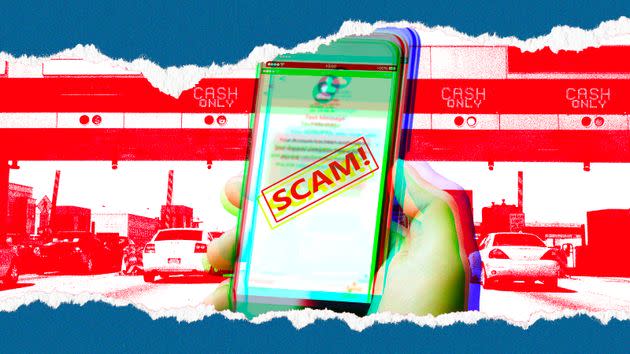Watch Out For This Sneaky Toll Phone Scam That's Affected Thousands Of People

“We’ve noticed a balance of $11.69 remaining on your record. To prevent a late fee of $50.00, please visit _______ to settle your balance.”
A text from someone alleging to be your state’s toll collection agency may not immediately ring alarm bells. Summer is road trip season, and if you drive, you know how easy it can be to pass through a toll road and incur an unexpected fee.
But you should be wary if you receive a text about a sudden outstanding toll charge.
There’s a new, increasingly popular scam in which bad actors impersonate state toll collection services, saying they’re from “New York SUNPASS” or “NJ Turnpike toll services,” for example. They want to trick you into giving up your credit card and driver’s license to pay them for fake toll charges. And it’s working.
Transportation authorities in Kansas, New Jersey, New York, Maryland, Michigan, Missouri, Louisiana, and Nebraska have all recently warned people about a rise in toll text scams. FBI Baltimore supervisory special agent Keith Custer told HuffPost that the agency’s Internet Crime Complaint Center has received over 10,000 complaints about these toll scam texts in the past few months.
Although most people who are reporting the complaints recognize the scam as a scam, Custer said “a number of people did click through on the links that were in the text messages.”
He noted that the scammers appear to move from state to state after their domains get shut down; Custer said the FBI is seeing the most complaints from Oregon, Connecticut, Michigan and Washington at the moment.
The scammers usually want you to just pay a nominal fee –– that’s by design. Amy Nofziger, the director of victim support for the AARP Fraud Watch Network, said a text asking you to pay $10,000 is more obviously a scam, but one for a smaller amount may catch people off-guard, she said, “because how many times have any of us in real life maybe underpaid something?”
What scammers are seeking is actually more important than your money. Custer said the biggest danger with this scam is “credential harvesting” credit card data or personally identifiable information.
When you get to the fraudulent toll collection website, “the first thing you’ll do is be asked to log in with the username and password,” Custer explained. “And then the bad guys are going to take that username and password and attempt to use that at major financial institutions.”
How to avoid being scammed by a fake toll text
Some states do inform people about outstanding toll fees by text, but many do not, so one big red flag is getting an unsolicited text about a toll fee. Nofziger said the majority of toll fee notices come through the mail.
When tolls “scan your license plate with their cameras, that goes to your vehicle registration, which has your address on it, not necessarily your phone number,” said Melanie McGovern, the director of public relations for the Better Business Bureau, a nonprofit that tracks misleading advertisements and customer complaints in North America.
One other way to prevent being fooled is to think before you click on a website for a toll collection service. Take a few seconds to remember whether or not you were driving in the area that the toll is from.
Nofziger said to ask yourself: “Was I on the toll road that day? ... You can look at your calendar and go, ‘Oh, yes, I was going to the mountains that day.’”
And don’t panic if you see this kind of text, because that is when you stop listening to common sense.
“Any time we see something that claims it’s from the government or any kind of authority, I think a lot of people’s tendency is to click on it and see what it is,” McGovern said. “So resisting the urge to act immediately is really important.”

What you can do if you got fooled by the toll scam
Prevention is the best form of scam protection. But if you have paid for a fake toll fee, there are immediate steps you can take to protect your privacy and wallet:
Monitor your bank accounts.
If you clicked any link or provided your information, keep an eye on your financial accounts and dispute any unfamiliar charges with your credit card company. You can also place a free fraud alert notice via major credit bureaus Experian, TransUnion and Equifax, which will make it harder for someone to open an account at a credit card company in your name.
And if you haven’t done so already, you should enable two-factor authentication for your accounts, Custer recommended.
Report what happened to authorities.
If you do believe your identity has been compromised, go to Federal Trade Commission website IdentityTheft.gov, which will walk you through a recovery plan.
You can also file a complaint with the Internet Crime Complaint Center. For your complaint, you’ll want to remember the phone number from where the text originated and the website listed within the text. Custer said these complaints can inform when the FBI needs to send out a public service announcement for a state.
Delete the fraudulent text.
After you report the text, delete it so you do not accidentally click the link by accident, McGovern recommended.
Custer said reporting the text as spam also helps telecommunication providers filter out these texts.
Learn your state’s actual toll collection service.
This scam is particularly effective because many of us do not know what our local toll collection service is called. In New York, the state’s Thruway Authority warned on its Facebook that a text linking to nytollservices.com is not legitimate –– but that tollsbymailny.com/ptn could be real.
The best way to not get fooled by this scam is to confirm the name and website of your area’s toll collection service, and check your account using the toll service’s legitimate website.
Taking these extra few minutes to verify information may be more of an inconvenience, but in the long run, they could be saving you from the bigger headache of getting scammed.

